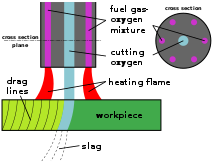What does flame cutting mean?
Definitions for flame cutting
flame cut·ting
This dictionary definitions page includes all the possible meanings, example usage and translations of the word flame cutting.
Wikipedia
flame cutting
Oxy-fuel welding (commonly called oxyacetylene welding, oxy welding, or gas welding in the United States) and oxy-fuel cutting are processes that use fuel gases (or liquid fuels such as gasoline or petrol, diesel, bio diesel, kerosene, etc) and oxygen to weld or cut metals. French engineers Edmond Fouché and Charles Picard became the first to develop oxygen-acetylene welding in 1903. Pure oxygen, instead of air, is used to increase the flame temperature to allow localised melting of the workpiece material (e.g. steel) in a room environment. A common propane/air flame burns at about 2,250 K (1,980 °C; 3,590 °F), a propane/oxygen flame burns at about 2,526 K (2,253 °C; 4,087 °F), an oxyhydrogen flame burns at 3,073 K (2,800 °C; 5,072 °F) and an acetylene/oxygen flame burns at about 3,773 K (3,500 °C; 6,332 °F).During the early 20th century, before the development and availability of coated arc welding electrodes in the late 1920s that were capable of making sound welds in steel, oxy- acetylene welding was the only process capable of making welds of exceptionally high quality in virtually all metals in commercial use at the time. These included not only carbon steel but also alloy steels, cast iron, aluminium, and magnesium. In recent decades it has been superseded in almost all industrial uses by various arc welding methods offering greater speed and, in the case of gas tungsten arc welding, the capability of welding very reactive metals such as titanium. Oxy-acetylene welding is still used for metal-based artwork and in smaller home-based shops, as well as situations where accessing electricity (e.g., via an extension cord or portable generator) would present difficulties. The oxy-acetylene (and other oxy-fuel gas mixtures) welding torch remains a mainstay heat source for manual brazing and braze welding, as well as metal forming, preparation, and localized heat treating. In addition, oxy-fuel cutting is still widely used, both in heavy industry and light industrial and repair operations. In oxy-fuel welding, a welding torch is used to weld metals. Welding metal results when two pieces are heated to a temperature that produces a shared pool of molten metal. The molten pool is generally supplied with additional metal called filler. Filler material selection depends upon the metals to be welded. In oxy-fuel cutting, a torch is used to heat metal to its kindling temperature. A stream of oxygen is then trained on the metal, burning it into a metal oxide that flows out of the kerf as dross.Torches that do not mix fuel with oxygen (combining, instead, atmospheric air) are not considered oxy-fuel torches and can typically be identified by a single tank (oxy-fuel cutting requires two isolated supplies, fuel and oxygen). Most metals cannot be melted with a single-tank torch. Consequently, single-tank torches are typically suitable for soldering and brazing but not for welding.
Wikidata
Flame cutting
Flame cutting is a destructive phenomenon that occurs in some firearms as a result of hot gases under high pressure. The most common manifestation is on the underside of a revolver top strap, where the hot, high-velocity gases released when a round is fired begin to cut through just above and in front of the cylinder. In most cases, this is self-limiting; eventually, the depth of the cut will place the undamaged material far enough away that the heat and pressure of the gas will have dissipated to harmless levels. This limiting tends to occur before structural integrity is compromised.
Numerology
Chaldean Numerology
The numerical value of flame cutting in Chaldean Numerology is: 2
Pythagorean Numerology
The numerical value of flame cutting in Pythagorean Numerology is: 5
Translation
Find a translation for the flame cutting definition in other languages:
Select another language:
- - Select -
- 简体中文 (Chinese - Simplified)
- 繁體中文 (Chinese - Traditional)
- Español (Spanish)
- Esperanto (Esperanto)
- 日本語 (Japanese)
- Português (Portuguese)
- Deutsch (German)
- العربية (Arabic)
- Français (French)
- Русский (Russian)
- ಕನ್ನಡ (Kannada)
- 한국어 (Korean)
- עברית (Hebrew)
- Gaeilge (Irish)
- Українська (Ukrainian)
- اردو (Urdu)
- Magyar (Hungarian)
- मानक हिन्दी (Hindi)
- Indonesia (Indonesian)
- Italiano (Italian)
- தமிழ் (Tamil)
- Türkçe (Turkish)
- తెలుగు (Telugu)
- ภาษาไทย (Thai)
- Tiếng Việt (Vietnamese)
- Čeština (Czech)
- Polski (Polish)
- Bahasa Indonesia (Indonesian)
- Românește (Romanian)
- Nederlands (Dutch)
- Ελληνικά (Greek)
- Latinum (Latin)
- Svenska (Swedish)
- Dansk (Danish)
- Suomi (Finnish)
- فارسی (Persian)
- ייִדיש (Yiddish)
- հայերեն (Armenian)
- Norsk (Norwegian)
- English (English)
Word of the Day
Would you like us to send you a FREE new word definition delivered to your inbox daily?
Citation
Use the citation below to add this definition to your bibliography:
Style:MLAChicagoAPA
"flame cutting." Definitions.net. STANDS4 LLC, 2025. Web. 14 Mar. 2025. <https://www.definitions.net/definition/flame+cutting>.







Discuss these flame cutting definitions with the community:
Report Comment
We're doing our best to make sure our content is useful, accurate and safe.
If by any chance you spot an inappropriate comment while navigating through our website please use this form to let us know, and we'll take care of it shortly.
Attachment
You need to be logged in to favorite.
Log In